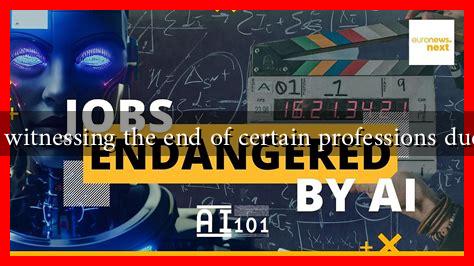-
Table of Contents
Are We Witnessing the End of Certain Professions Due to AI?
The rapid advancement of artificial intelligence (AI) has sparked a significant debate about its impact on the job market. As AI technologies become increasingly sophisticated, many professionals are left wondering whether their jobs are at risk. This article explores the potential obsolescence of certain professions due to AI, examining the implications for workers and the economy as a whole.
The Rise of AI: A Double-Edged Sword
AI has the potential to revolutionize various industries by enhancing efficiency, reducing costs, and improving accuracy. However, this transformation comes with a downside: the displacement of human workers. According to a report by McKinsey, up to 800 million jobs could be lost globally by 2030 due to automation and AI technologies. While some jobs will be created in the process, the net effect could be a significant reduction in available positions in certain sectors.
Professions at Risk
Several professions are particularly vulnerable to automation and AI. Here are some key areas where job displacement is most likely:
- Manufacturing: Robotics and AI have already transformed manufacturing processes, leading to increased productivity but also job losses. For instance, companies like Tesla and Foxconn have implemented AI-driven robots to perform tasks traditionally done by humans.
- Customer Service: AI chatbots and virtual assistants are increasingly handling customer inquiries, reducing the need for human customer service representatives. A study by Gartner predicts that by 2025, 75% of customer service interactions will be powered by AI.
- Transportation: The rise of autonomous vehicles poses a significant threat to jobs in the transportation sector. Truck drivers, taxi drivers, and delivery personnel may find their roles diminished as self-driving technology becomes more prevalent.
- Data Entry and Administrative Roles: AI can efficiently process and analyze large volumes of data, making many data entry and administrative jobs redundant. Tools like Microsoft’s Power Automate are already streamlining these tasks.
Case Studies: Real-World Examples
Several companies have already begun to replace human workers with AI technologies, providing a glimpse into the future of work:
- Amazon: The retail giant has implemented AI-driven robots in its warehouses to assist with inventory management and order fulfillment, significantly reducing the need for manual labor.
- IBM Watson: In the healthcare sector, IBM’s AI system is being used to analyze medical data and assist in diagnosis, potentially reducing the demand for certain medical professionals.
- ChatGPT: OpenAI’s language model has been adopted by various businesses for content creation, customer support, and even coding, showcasing the potential for AI to replace roles traditionally held by writers and programmers.
Adapting to Change: The Future of Work
While the threat of job loss due to AI is real, it is essential to recognize that not all professions will disappear. Many jobs will evolve, requiring new skills and adaptability. Here are some strategies for workers to consider:
- Upskilling: Workers should invest in learning new skills that complement AI technologies, such as data analysis, programming, and digital marketing.
- Emphasizing Human Skills: Professions that require emotional intelligence, creativity, and complex problem-solving are less likely to be automated. Focusing on these skills can provide a competitive edge.
- Exploring New Opportunities: As AI creates new industries and job roles, workers should remain open to exploring opportunities in emerging fields such as AI ethics, machine learning, and data science.
Conclusion: Navigating the AI Landscape
In conclusion, while AI poses a significant threat to certain professions, it also presents opportunities for growth and innovation. The key to navigating this changing landscape lies in adaptability and continuous learning. By embracing new technologies and developing skills that complement AI, workers can position themselves for success in an increasingly automated world. As we move forward, it is crucial for policymakers, educators, and businesses to collaborate in creating a workforce that is prepared for the challenges and opportunities presented by AI.
For further reading on the impact of AI on jobs, you can explore resources from the World Economic Forum [here](https://www.weforum.org/agenda/2020/10/future-of-jobs-report-2020/).

